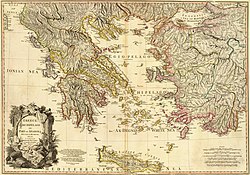Overview Regions Central Greece (Aetolia-Acarnania (Aetolia , Acarnania ), Attica , Boeotia , Euboea , Evrytania , Phocis , Phthiotis , Saronic Islands ) Crete (Chania , Heraklion , Rethymno , Lasithi ) Cyclades (Andros , Delos , Kea , Kythnos , Milos , Mykonos , Naxos , Paros , Santorini , Syros , Tinos ) Dodecanese (Agathonisi , Astypalaia , Chalki , Kalymnos , Karpathos , Kasos , Kos , Leipsoi , Leros , Nisyros , Patmos , Rhodes , Symi , Tilos , Kastellorizo ) Epirus (Arta , Ioannina , Preveza , Thesprotia ) Ionian Islands (Corfu , Ithaca , Kefalonia , Kythira , Lefkada , Paxi , Zakynthos ) Macedonia (Chalkidiki , Drama , Florina , Grevena , Imathia , Kastoria , Kavala , Kilkis , Kozani , Pella , Pieria , Serres , Thasos , Thessaloniki ) North Aegean islands (Chios , Ikaria , Lemnos , Lesbos , Samos ) Peloponnese (Arcadia , Argolis , Corinthia , Laconia , Messenia , Achaea , Elis ) Thessaly (Karditsa , Larissa , Magnesia , Trikala , Sporades ) Thrace (Evros , Rhodope , Xanthi ) Terrain Water Environment
Society
Demographics Culture Anastenaria Caryatid Clean Monday Concept of kingship Dress (Chiton , Chlamys , Exomis , Fustanella , Himation , Mariner's cap , Peplos , Perizoma , Tsarouchi , Vraka ) Eastern Party Festivals Folklore Greek East and Latin West Greektown Hellenization Hospitality Carols (Christmas , New Year's , Theophany's ) Mangas Mountza Naming customs Paideia Philhellenism and Hellenophobia Plate smashing Philosophy Public holidays (Independence Day , Ohi Day ) Rouketopolemos Souliotic songs Theophany Tsiknopempti Units of measurement Worry beads Art Cuisine Breads (Daktyla , Kritsini , Lagana , Paximadi , Tsoureki ) Desserts (Diples , Halva , Koulourakia , Kourabiedes , Loukoumades , Melomakarona , Pasteli , Spoon sweets , Vasilopita ) List of dishes Drinks (Mastika , Metaxa , Ouzo , Rakomelo , Sideritis , Tentura , Tsipouro , Tsikoudia , Frappé coffee ) Cheeses (Anthotyros , Feta , Graviera , Kasseri , Kefalotyri , Ladotyri , Manouri , Metsovone , Mizithra ) Filo (Amygdalopita , Bougatsa , Galaktoboureko , Karydopita , Spanakopita , Tiropita ) Greek salad (Dakos ) Meze Pasta (Gogges , Flomaria , Hilopites ) Restaurants (Kafenio , Ouzeri , Taverna ) Sauces (Skordalia , Taramosalata , Tirokafteri , Tzatziki ) Souvlaki Varieties (Heptanesean , Cretan , Epirote , Macedonian ) Wine (Agiorgitiko , Aidini , Assyrtiko , Athiri , Kotsifali , Lesbian , Limnio , Mavrodafni , Mandilaria , Malagousia , Malvasia , Moschofilero , Retsina , Robola , Savatiano , Vilana , Xinomavro ) Languages Greek alphabet (History , Orthography , Diacritics , Braille , Cyrillization , Romanization (Greeklish ) and numerals Greek language (Demotic , Katharevousa ) and dialects (Cappadocian , Cretan , Cypriot , Greco-Australian , Maniot , Pontic , Tsakonian , Yevanic ) Greek Sign Language History (Mycenaean Greek , Ancient Greek , Koine Greek , Medieval Greek , Modern Greek ) Literature (Ancient , Medieval , Modern ) Minority languages (Albanian language (Arvanitika ), Aromanian , Balkan Romani , Bulgarian , Ladino , Macedonian , Megleno-Romanian , Turkish ) Proverbs Words for love Media Music Church music Dances (Ai Georgis , Angaliastos , Antikristos , Ballos , Dionysiakos , Fisounis , Gaitanaki , Geranos , Hasapiko , Ikariotikos , Kalamatianos , Kangeli , Kastorianos , Kerkiraikos , Koftos , Pidikhtos , Leventikos , Maniatikos , Metsovitikos , Ntames , Palamakia , Partalos , Pentozali , Proskinitos , Pyrrhichios , Rougatsiarikos , Sirtaki , Sousta , Syrtos , Trata , Tsakonikos , Tsamikos , Zeibekiko , Zervos ) Éntekhno Folk music (Cretan , Epirote , Heptanesian , Macedonian , Nisiotika , Peloponnesian , Pontic , Thessalian , Thracian ) Hip Hop Ionian School Laïko (Skyladiko ) Musical instruments (Askomandoura , Aulos , Bouzouki , Byzantine lyra (Cretan , Macedonian , Politiki , Pontic ), Crotala , Floghera , Gaida , Harp , Laouto , Lyre , Organo , Pan flute , Phorminx , Psaltery , Salpinx , Santouri , Souravli , Tambouras , Tambourine , Trigono , Tsampouna , Tympano , Zilia ) Rebetiko Rock (Punk ) Religion and lore Ancient religion (Origins , Modern Revival ) Aerico Buddhism Catholicism Drosoulites Eastern Orthodox Church (Timeline: Antiquity , Early Middle Ages , Late Middle Ages , Early Modern Era , 19th century , Early 20th century , Late 20th century , Contemporary ) Fairy tales Gello Greek Orthodox Church (Ecumenical Patriarchate of Constantinople , Church of Greece , Flag ) Greek Old Calendarists Hinduism Hypertimos Islam Judaism (History ) Kallikantzaros Lamia Mormo Mount Athos Mythology (Primordial deities , Titans , Twelve Olympians , Heracles , Odysseus , Jason , Oedipus , Perseus , Daedalus , Orpheus , Theseus , Bellerephon , Satyr , Centaur ) Nymph Protestantism Psychai Sikhism Thymiaterion Name days Vrykolakas Wayside shrine Sport Symbols








